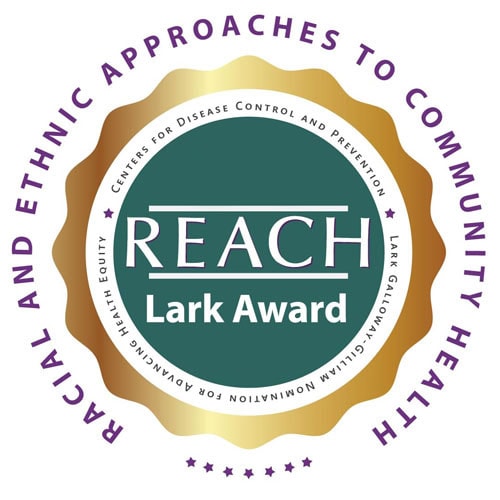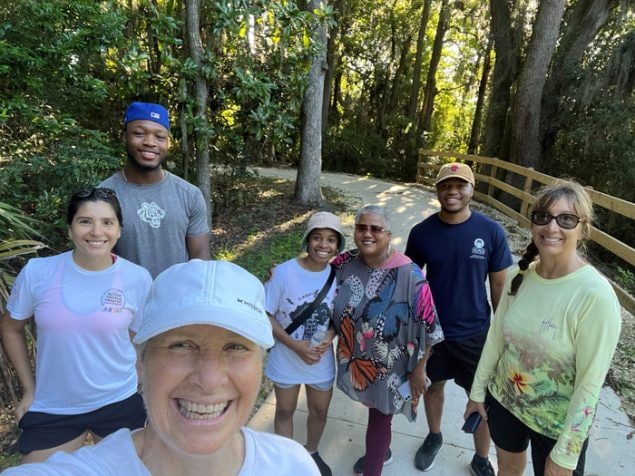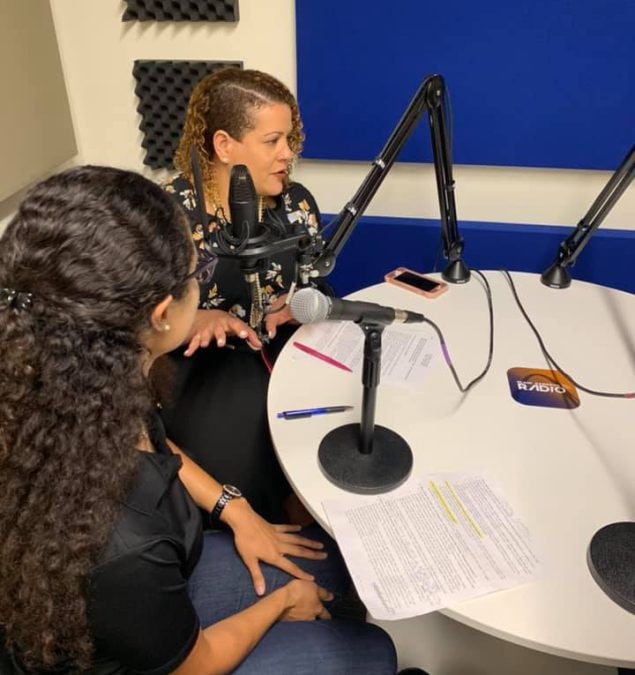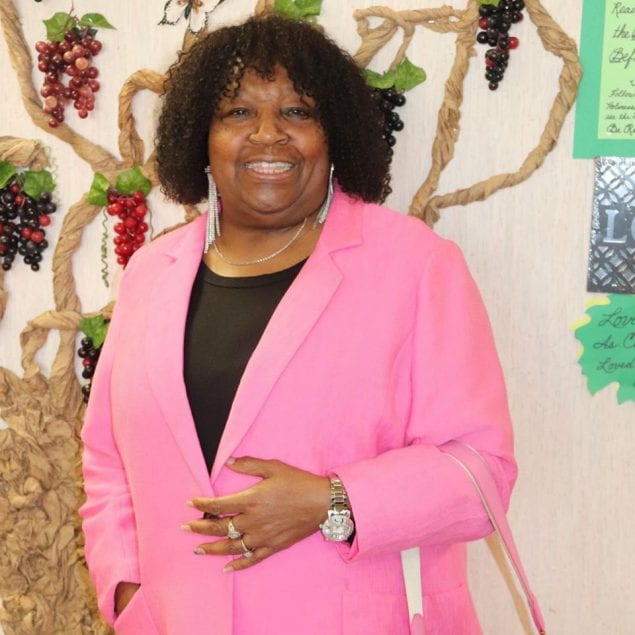REACH Lark Galloway-Gilliam Awards for Advancing Health Equity Challenge

Across the United States, some groups are less healthy than others. Reasons for this include where people live, access to places to be physically active or healthy foods, how much money or education they have, and how they are treated because of their racial or ethnic backgrounds.
The Racial and Ethnic Approaches to Community Health (REACH) program is at the forefront of CDC’s efforts to reduce health disparities. Established in 1999, REACH has successfully addressed health disparities and promoted health equity by engaging with diverse communities and implementing culturally tailored interventions.
The REACH Lark Award Challenge recognizes extraordinary individuals, organizations, or community coalitions associated with the REACH program. Award recipients have meaningfully assisted with activities that advance health equity, reduce health disparities, and increase community engagement to address preventable health risks. Examples of such risks are tobacco use, poor nutrition, physical inactivity, and inadequate access to clinical services. Award recipients have worked with groups affected by chronic diseases more than other groups, specifically African American/Black, American Indian or Alaska Native, Asian, Hispanic or Latino, and Native Hawaiian or other Pacific Islander persons.
About Lark Galloway-Gilliam
This award is in memory of Lark Galloway-Gilliam who was the founding executive director of Community Health Councils, Inc. The council began in 1992 to support planning, resource development, and policy education in response to the growing health crisis in South Los Angeles. The Council’s work extends to other communities throughout Los Angeles County.
Ms. Galloway-Gilliam led the Community Health Councils, Inc. to engage communities and strengthen the connections among organizations to improve health, eliminate disparities, and achieve health equity. Under Ms. Galloway-Gilliam’s leadership, the council became an expert in health equity in Los Angeles, across California, and in the country. Ms. Galloway-Gilliam also served in several leadership roles, including the Martin Luther King Jr. Medical Center Advisory Board, and the Institute for People, Place and Possibility Board of Directors for Community Commons. She was the first president of the National REACH Coalition.
Two REACH Lark Galloway-Gilliam Awards for Advancing Health Equity awards were given in 2022. Healthy Savannah received the organization award, and Thamara Labrousse received the individual award.
Organizational Award

Healthy Savannah staff on a group walk.
The Healthy Savannah (Georgia) Initiative was established in 2007 with the leadership of Mayor Otis Johnson, who sought to make Savannah a healthier place to live, learn, work, and play. Mayor Johnson had a heart attack in 2006 and knew that the risk of heart disease is higher among African American and Hispanic/Latino adults than other adults. His work to bring people together from many sectors to create a culture of health led to creation of Healthy Savannah.
In 2018, Healthy Savannah partnered with the YMCA of Coastal Georgia, and together they were selected as a recipient for CDC’s Racial and Ethnic Approaches to Community Health (REACH) program. REACH provided resources and expertise to create healthier nutrition and physical activity environments while focusing on achieving health equity and reducing health disparities.
In July 2022, Healthy Savannah received the organizational REACH Lark Galloway-Gilliam Award for Advancing Health Equity. The award recognizes Healthy Savannah’s efforts to reduce health disparities among African American and Hispanic/Latino American residents with low incomes in Chatham County.
Savannah is a tight-knit community with people committed to keeping it healthy and strong, said Paula Kreissler, Healthy Savannah executive director. Yet asking the community about their needs revealed that many residents have food insecurity, live in food deserts, and lack access to places to be physically active. Survey data also showed higher rates of chronic disease in neighborhoods with mostly African American residents.
“It started out difficult. But building relationships made it easier. I found someone in each organization to focus on health and wellness to build a network. It’s a beautiful thing once [people] find out you care about them and you’re compassionate about your work.”—Lessie Williams on assembling a network to advance health equity.
Listening to the community’s needs drove Healthy Savannah to focus on improving physical activity and nutrition. The group created programs such as:
- Healthy Walks encourages community members to walk through neighborhoods, local trails, and historic areas.
- Active People, Healthy Savannah, as part of CDC’s Active People, Healthy NationSM initiative, helped create 30 miles of urban trails through Tide to Town Trail.
- Healthy Checkout Initiative partnered with local grocery stores so shoppers can easily see fruit or other healthy options instead of candy near the checkout.
- FarmTruck 912, a mobile farmer’s market, brings local, affordable seasonal fruits and vegetables to Savannah neighborhoods. FarmTruck912 accepts and doubles the benefits of Supplemental Nutritional Assistance Programs (SNAP) and Electronic Benefits Transfer (EBT).
Individual Award

Thamara Labrousse, right, in a radio interview about increasing access to healthy food.
For Thamara Labrousse, Miami Gardens, Florida, is a beautiful, resilient, and strong city with a rich history and culture and an engaged community. With more than 113,000 residents, it is the third largest city in Miami-Dade County and the largest predominantly African American city in Florida. The city also has high rates of some chronic diseases, and city leaders are committed to making Miami Gardens a healthier place for people to live, work, and play.
In 2014, Miami Gardens partnered with the Health Foundation of South Florida to launch Live Healthy Miami Gardens (LHMG). The coalition includes 46 member organizations and more than 100 individuals working collectively for citywide changes that improve health and life expectancy. The coalition is dedicated to serving African American and Hispanic residents.
Ms. Labrousse was asked to become the program director of LHMG when it began because of her extensive experience with community engagement projects. In 2018, LHMG became a recipient of CDC’s Racial and Ethnic Approaches to Community Health (REACH) program.
Under Ms. Labrousse’s leadership, LHMG works to remove barriers associated with racial and ethnic health disparities while listening to and engaging the community at every step. Planning includes time for community outreach and data collection to allow community involvement, buy-in, and decision making.
“This work is all about community. You can’t effectively do without the very people who are the most impacted by the problem being at the table…. It can be very complex, and many days it may not feel like you are accomplishing anything, but keep going. If you keep showing up and trying, you will eventually find success.”—Thamara Labrousse
LHMG has made progress toward increasing access to healthy foods, opportunities for physical activity, and access to primary health care services and mental health resources. For example, LHMG worked with Miami-Dade County Public Schools to set up, support, and reinforce nutrition and healthy eating wellness policies in 25 Miami Gardens schools. LHMG and the schools also developed a comprehensive Safe Routes to Schools plan to create a safe environment around schools and promote opportunities to walk or bike to school. In addition, the coalition has carried out evidence-based strategies to address the misuse of alcohol, tobacco, and other drugs.
For her leadership in Live Healthy Miami Garden’s commitment to achieve health equity, Thamara Labrousse received the Individual REACH Lark Galloway-Gilliam Award for Advancing Health Equity in July 2022.

Lessie Williams
Lessie Williams received the first REACH Lark Galloway-Gilliam Award in August 2020. For 20 years, Ms. Williams worked for Highland Haven, a nonprofit organization in Portland, Oregon. For 5 years, she was the Highland Haven executive director. She created youth violence prevention programs, expanded access to culturally-relevant mental health services, and launched culturally-tailored health education programs to promote healthy behaviors such as healthy eating, physical activity, and tobacco cessation. Highland Haven partnered with the Multnomah County Health Department, a REACH recipient.
Before joining Highland Haven, Ms. Williams and two others formed a church committee in 2000. The committee’s goals were to give back to the community, build credibility within the community, and empower young people and families to become healthy adults.
Ms. Williams’ committee initially ran into obstacles gaining participation and funding. But the team kept looking for resources. They partnered with Multnomah County Health Department’s REACH program and focused on building the community one person at a time.
“It started out difficult. But building relationships made it easier. I found someone in each organization to focus on health and wellness to build a network. It’s a beautiful thing once [people] find out you care about them and you’re compassionate about your work.”—Lessie Williams on assembling a network to advance health equity.
The REACH program provided Ms. Williams’ team with technical assistance to determine their community assets and what changes they could implement. Together, they conducted surveys and planned events relevant to the needs of the community, including breastfeeding campaigns, nutrition education, and smoking cessation events. They formed relationships with faith organizations, health coalitions for people who are African American, and local businesses to achieve common goals.
Since beginning their work, Ms. Williams has seen an increase in the number of churches or faith communities with dedicated wellness teams. Additionally, Highland Haven and REACH influenced the social norms of the community by implementing nutrition guidelines and culturally appropriate health signage. Conversations about health and nutrition are now common, and the community expects healthy food and water at events. Highland Haven, with support from REACH, plays a critical role in providing access to healthy foods, while decreasing the availability of unhealthy items such as sugar-sweetened beverages.
